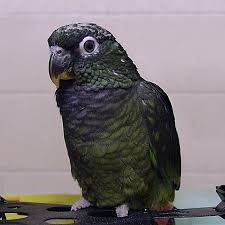Maximilian’s Pionus

Description
The Maximilian pionus (Pionus maximiliani) is a species of bird in the family Psittacidae, the true parrots. It is also called scaly-headed pionus, scaly-headed parrot, Maximilian parrot, Maximilian's pionus, or Maximilian's parrot.
It is found in eastern Brazil, central and eastern Bolivia, Paraguay, and northern Argentina. It is found in a wide range of wooded habitats, from humid subtropical forest to arid Caatinga. It is fairly common throughout a large part of its range. It is typically seen in pairs or small flocks. The scaling to the head for which it is named is typically far less distinct than the bright red undertail coverts (a feature found in all members of the genus Pionus).
Its name is a reference to Prince Maximilian of Wied-Neuwied, a nobleman and naturalist who explored the hinterlands of southeastern Brazil in the early 19th century.
In Brazil, they are called cocotas or maritacas (from mbaé'taka, tupi for "noisy bird")
Scientific Name
Pionus Maximilianis
Country Of Origin
Size
Life Expectancy
Noise Level
Talk / Trick Ability
Fair; can learn to speak but not with the clearest voice. Maximilian’s Pionus are known as the best talkers within the Pionus group.
Characteristics
The Maximilian’s Pionus can be a little more mischievous than othe Pionus parrots. While Maximilian’s Pionus parrots are often overlooked because of their lack of bright colors, owners say their sweet personalities win people over. Hand-reared pet Pionus parrots are especially sweet and gentle, but they also enjoy their independence.
Behavior / Health Concerns
Some Maximilian’s Pionus parrots can become aggressive and territorial, so socialize your bird early on to avoid unwanted behavior. Sleep is important for all Pionus parrots. Let them have 11 or 12 hours every night. They susceptible to vitamin-A deficiency, visceral gout, aspergillosis (respiratory disease), fungal infections and obesity. A mixed seed and pelleted diet along with fresh fruits and vegetables is ideal for this pet bird. Maximilian’s Pionus parrots often prefer cabbage, broccoli, peas and carrots.